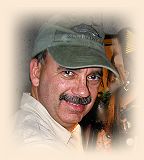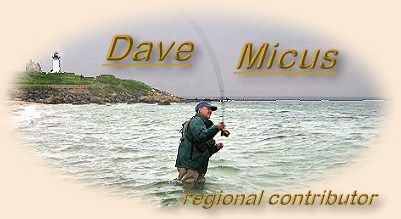|
I particularly enjoy the quiet of fly
fishing. It's pleasant to have the
opportunity to be alone with one's
thoughts, and I often find that 'problems'
which seemed overwhelming a short time
before become merely minor obstacles to
overcome when viewed through the sportsman's
prism.
But this propensity toward peace and quiet
wasn't always so. As a boy it was difficult
to shut me up, especially when fishing, as
I fluctuated between whining and moaning when
the fish weren't biting to yelling and shouting
when they were. It was only when fishing with
my great uncle Albert that I learned the value
of tranquility.
Albert had been a coal miner, and after
spending a lifetime in a claustrophobic
cave with the constant drone of loud
machinery, he enjoyed, when we fished or
crabbed, the vastness and silence of the
ocean.
"Shhhhh!" he'd whisper to me when I was
noisy. "The crabs can hear you!"
And as excitable and gabby as I was, I
granted his wish for silence and would do
my best to sit still. I knew that by doing
so I would be rewarded with his wonderful
stories.
He and his brothers were wildcat miners
during the Great Depression, living with
other first-generation Lithuanian immigrants
in the tiny mining town of Gilberton,
Pennsylvania. It was a hardscrabble life,
but you would never know it from Albert's
tales.
"We were pretty carefree," he would say, "and
we had a lot of fun. Why, we had enough dynamite
in the garage to blow up the entire town, but
we never gave anything like that a thought.
We'd work all day and then go to the tavern
at night. Gilberton was dry, so we had to go
to a speak, in the back of the firehouse." (I
visited Gilberton in the 1970s and the town was
still dry. The only place you could get a drink
was in the back of the firehouse, an open secret,
and we had to give my great uncle's last name and
explain our relationship with him before we were
allowed to enter.)
"One night, after drinking in the firehouse,"
Albert told me, "we got to our house and couldn't
fit the motor (all of my great uncles called cars
'motors') in the garage. We tried and tried and
just couldn't do it. So we figured we had too much
to drink and went to bed. The next morning we
realized that it wasn't our motor-it was much
longer and that's why it didn't fit."
"How did you get the key for that car?" I asked.
"Motors didn't have keys back then. You just
pushed a starter button."
"What did you do?"
"We went back to the tavern and found out
whose motor it was. We drove to his house,
and there was our motor. He didn't realize
he had taken the wrong motor, either."
While these were the usual tone of Albert's
stories, there were tragedies, and these, too,
made an indelible impression in the mind of a
young boy.
"We had our own shaft and a coal car. We
would put our motor up on blocks, take off
the tire, wrap a rope around the hub, and
use that to pull up or lower the coal car
by stepping on the gas to pull it up and
putting it in reverse and lowering it down,"
Albert explained. "Once I was working the
motor, and your uncle Joe and another fellow
named Joey who worked with us were down in
the shaft. The rope pulling the coal car
broke and the coal car ran away. Your uncle
Joe managed to jump aside, but the car hit
Joey square, and split his head wide open."
"What happened then?" I asked, wide-eyed.
"We brought him to our house, he laid unconscious
for three days, then he died."
"Didn't you bring him to the hospital?"
"No, it was too far away. He would have
never made it. They couldn't do anything
for him anyway."
But Albert's most poignant story isn't one
he told. Years of working in the mines had
given him miners' disease or black lung, as
lung cancer was called, and though he lived
to a fairly old age the mines finally caught
up to him. The disease progressed, he became
more ill, and there came the day when the doctor
said it was only a matter of hours. In a cruel
coincidence, that day was his wife Jenny's
birthday.
Albert lay in bed with Jenny at his side, and
she could see him struggling to hold on to that
last spark of life. As the night progressed
she noticed that he frequently used the small
flashlight on his bedside table to check the
clock, as if he was waiting for something.
And he was. When midnight passed, Albert
relaxed and let go of the ghost. He was
determined not to allow fate to be so malicious
as to have him die on his true love's birthday.
All the great uncles are gone now, and there
are no longer the pinochle games or the family
gatherings were you could only speak Lithuanian
and were fined for grammatical errors in an
effort to keep the old language alive. But
every now and then while fishing alone I remember
Albert and a car that was too big to fit into
a garage and I chuckle and feel grateful for
having come from such stock. ~ Dave
About Dave:
 Dave Micus lives in Ipswich, Massachusetts. He is an
avid striped bass fly fisherman, writer and instructor.
He writes a fly fishing column for the Port City Planet
newspaper of Newburyport, MA (home of Plum Island and Joppa Flats)
and teaches a fly fishing course at Boston University.
Dave Micus lives in Ipswich, Massachusetts. He is an
avid striped bass fly fisherman, writer and instructor.
He writes a fly fishing column for the Port City Planet
newspaper of Newburyport, MA (home of Plum Island and Joppa Flats)
and teaches a fly fishing course at Boston University.
|



